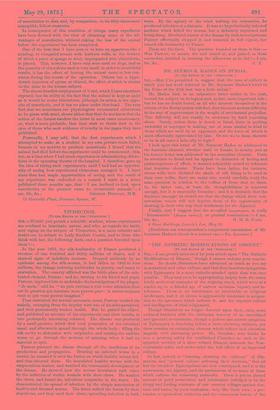VIVISECTION.
[TO THE EDITOR OF THE "SPECTATOR."]
Sin,—Would you permit a scientific student, whose experiments are confined to inanimate nature, and who, as regards the battle now raging on the subject of Vivisection, is a mere outsider and looker-on, to submit to Lady Burdett Coutta, and to those who think with her, the following facts, and a question founded upon them ?— In the year 1853, the silk-husbandry of France produced a revenue of one hundred and thirty millions of francs, and it showed signs of indefinite increase. Stopped suddenly by an epidemic among the silk-worms, it had fallen in 1865 to four millions, the change reducing multitudes to penury, and many to -starvation. The country afflicted was the birth-place of the cele- brated chemist, Dumas ; and he, turning to his friend and pupil, Pasteur, implored him to undertake the investigation of the plague. " Je meta," said he, " un prix extreme it voir votre attention fixee sur la question qui interesse mon pauvre pays ; la misere surpasse tout as que vous pouvez imaginer."
Thus entreated, for several successive years, Pasteur studied the malady, emerging from the inquiry with one of his sides paralysed, -and with permanently broken health. But he gained his object, -and published an account of his experiments and their results, in two profoundly interesting volumes. The disease was produced by a small parasite, which first took possession of the intestinal -canal, and afterwards spread through the whole body ; filling the silk cavity to distension with corpuscles, and causing the smitten worm to go through the motions of spinning when it had no material to spin.
Pasteur pursued the disease through all the conditions of its production and propagation. Bruising an infected worm in a mortar, he smeared it over the leaves on which healthy worms fed, and thus infected them. He inoculated healthy worms with the corpusculous matter, and watched the consequent development of the disease. He showed how the worms inoculated each other by the infliction of visible wounds with their claws. He washed the claws, and found the infectious corpuscles in the water. He demonstrated the spread of infection by the simple association of healthy and diseased worms. The latter sullied the leaves by their dejections, and they used their claws, spreading infection in both ways. By the agency of the wind wafting the corpuscles, he produced infection at a distance. It was no hypothetically infected medium which killed the worms, but a definitely organised and living thing. Rendered master of the disease by such investigations, Pasteur effectually stopped it, and restored, in full vigour, her ruined silk-husbandry to France.
These are the facts. The question founded on them is this :- Was Pasteur, to secure the end aimed at, and gained, in these researches, justified in treating the silkworms as he did ?—I am,


































 Previous page
Previous page